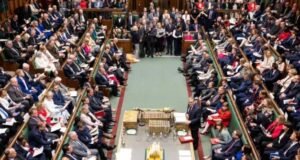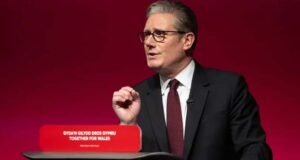Watchdog demands meeting with education department over ‘potentially misleading’ claims about school funding
The education secretary, Damian Hinds, has been publicly reprimanded by the UK statistics watchdog over his department’s repeated misuse of data, in particular its “potentially misleading” claims over schools funding.
The UK Statistics Authority (UKSA) complained it had had reason to write to the Department for Education (DfE) on four separate occasions in the past year about its presentation and use of education statistics, yet still issues had not been resolved.
In an unusually strongly-worded letter, the UKSA chair, Sir David Norgrove, said he had “serious concerns” about the DfE’s use of statistics. He demanded a meeting with the DfE permanent secretary, Jonathan Slater, and sought reassurance that in future the DfE would observe the statutory code of practice for statistics.
The shadow education secretary, Angela Rayner, said the UKSA letter represented a “humiliating rebuke” for Conservative ministers and called on the government to come clean over the crisis in school funding.
The intervention by the UKSA follows a row last week over a claim by the DfE and the schools standards minister, Nick Gibb, that the UK’s spending on education was the third highest in the world.
Complaints were made to the UKSA after it emerged in a BBC report that the OECD figures on which the claim was based included university student tuition loans as well as fees paid by private school pupils.
Hinds wrote to MPs over the weekend defending his department’s claims, but following its investigation, the UKSA ruled the figure “included a wide range of education expenditure unrelated to publicly funded schools … rather than a comparison of school spending alone.
“The result was to give a more favourable picture,” Norgrovesaid. “Yet the context would clearly lead readers to expect that the figures referred to spending on schools.”
An accompanying letter by Ed Humpherson, UKSA’s director general for regulation, to the DfE’s chief statistician piled on the criticism. “The way statistics have been presented gives a potentially misleading picture of changes in schools funding,” he wrote. “It is important that the department present statistics and data professionally and I encourage you to continue to work with communication teams to minimise the risk of misleading the public.”
Guardian Today: the headlines, the analysis, the debate – sent direct to you
Read more
The UKSA also complained about a DfE tweet about school funding featuring a graph with a truncated axis which had the effect of “exaggerating” school spending figures. The information was also presented in cash terms rather than real terms.
And on a separate issue the UKSA criticised Gibb’s claim that in an international survey of reading abilities of nine-year-olds, England had leaped up the rankings last year after decades of falling standards, moving from 19th out of 50 countries to 8th. “This is not correct,” Norgrove pointed out. “Figures published last year show the increase was from 10th place in 2011 to 8th place in 2016.”
The UKSA also ruled on a complaint from Rayner about the DfE’s oft-repeated claim that there are now “1.9 million more young people studying in good or outstanding schools”. The authority said the figure did not give a full picture, and should be set in the context of increasing pupil numbers, changes to the inspection framework and out-of-date inspections.
“I am sure you share my concerns that instances such as these do not help to promote trust and confidence in official data, and indeed risk undermining them,” said Norgrove.
Headteachers accused the government of eroding trust. Jules White, head of Tanbridge House school in West Sussex and leader of the Worth Less? group, which has lobbied for fairer funding, said: “Parents and the wider public have a right to know the facts and the government cannot have it both ways – you cannot slash our budgets and then pretend all’s well.
“The constant use of misinformation is placing an intolerable strain on headteachers’ relationships with the DfE. Trust is being eroded. We respectfully request the DfE to publicly set the record straight and, much more crucially, work with the chancellor to make a real-terms investment in our schools in the upcoming budget. ”
Paul Whiteman, general secretary of the National Association of Head Teachers, said: “If trust goes there is little left for the profession to hold on to. Failing to face up to the truth will cheat an entire generation. The chancellor must now step up and rescue education funding, it is in the national interest.”
The education secretary responded to the UKSA saying his department was looking into the precise issues raised but he went on to largely defend the disputed claims.
“It is true to say that the OECD has ranked the UK as the third highest for total education spending – the figure which includes tertiary and private education for every country,” Hinds insisted, adding that among G7 nations the UK government spent the highest percentage of its GDP on institutions delivering primary and secondary education.
He agreed his department “could have been clearer” on reading performance but once again stood by the claim about 1.9 million pupils in good or outstanding schools.
Rayner accused the Conservatives of deceiving the public in a desperate attempt to cover up their shocking record. “They have used misleading figures on school funding to hide the fact that they have cut billions of pounds from school budgets, leaving head-teachers forced to beg for donations from parents to pay for books and stationary.
“And their claims on school standards are now in tatters. Instead of relying on discredited statistics they should use the budget to invest in schools and genuinely improve standards.”
 Weekly Bangla Mirror | Bangla Mirror, Bangladeshi news in UK, bangla mirror news
Weekly Bangla Mirror | Bangla Mirror, Bangladeshi news in UK, bangla mirror news







